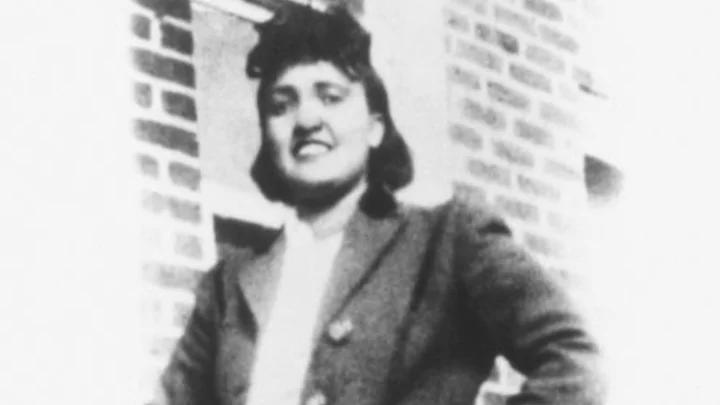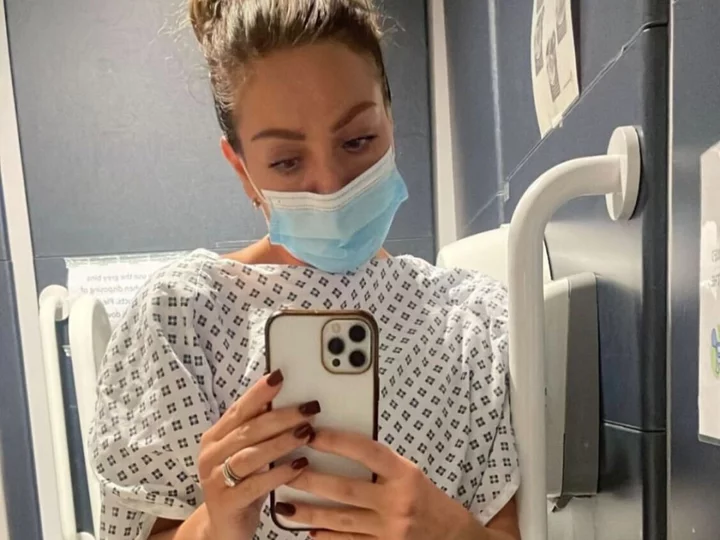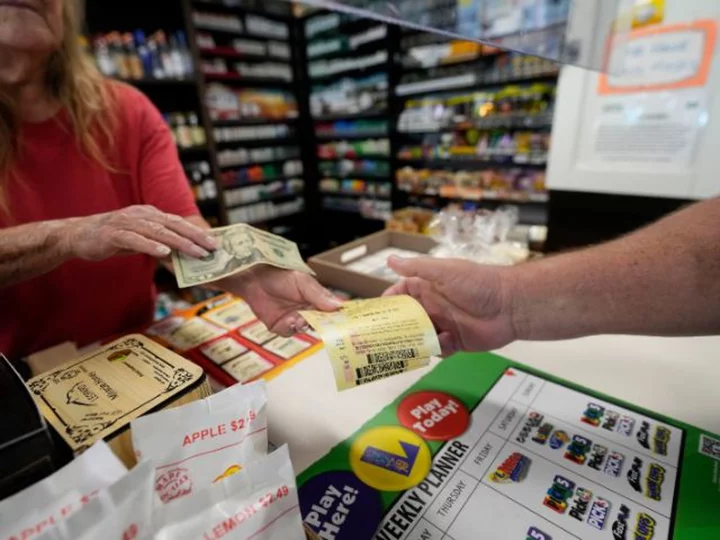
Bucks guard drops 83 points in Seattle Pro-Am game
Milwaukee Bucks guard MarJon Beauchamp broke the single-game scoring record at the Crawsover Pro-Am in Seattle.The Crawsover Pro-Am is one of the biggest basketball events of the summer. Over the years, NBA players such as LeBron James, Jayson Tatum, and Aaron Gordon have competed in the league....
1970-01-01 08:00

Henrietta Lacks: Family of black woman whose cells were taken settle case
An unknown settlement is reached after Henrietta Lacks' cells were used for medical advances.
1970-01-01 08:00

USMNT rumors: Adams to Chelsea, Balogun too pricey, no adventure for Tolkin
Today's USMNT rumors include Tyler Adams being linked with Chelsea. Folarin Balogun is reportedly tooexpensive for Inter Milan and the New York Red Bulls have rejected a bid for John Tolkin.USMNT rumors: Tyler Adams for ChelseaTyler Adams is the last USMNT player standing at Leeds United, w...
1970-01-01 08:00

Ashley James: ‘We have a totally warped idea of what a mum should be’
Ashley James says there’s “a total lack of understanding” about feeding babies – and that mothers who pump shouldn’t have to hide away. “With pumping, people should feel confident, just like with breastfeeding, to do that anywhere,” says the DJ and influencer. “If anyone were to have a problem with that, they need to address some deep-rooted issues of why feeding a child would be a problem.” James, who has a two-year-old son, Alfie, and a four-month-old daughter, Ada, with partner Tommy Andrews, argues there’s a huge lack of knowledge about how all-consuming feeding a child with breast milk is – from the hours spent feeding or pumping (an estimated eight to 12 times a day, up to 45 minutes each time for newborns) and “also the fact that you can’t just leave your child”. The 36-year-old says: “People don’t really know about engorgement, mastitis, blocked ducts, supply issues, and all the reasons that people choose to pump.” For example, going back to work. “[People think] ‘Oh just give them a bottle or pump in the morning, and then they’ll be fine’. There’s a total lack of awareness.” The former Made In Chelsea star, who hit the headlines after breastfeeding Alfie live on the Jeremy Vine Show in 2021, is currently using a pump alongside breastfeeding Ada for her to have the option of a bottle, too. “I ended up having to breastfeed [on TV] and there was this really weird backlash – people saying it was attention seeking. [Which is] funny to me. Let’s say that was my plan, I’m a total narcissist and I’d decided this was going to be my chance to get publicity… how would I have managed to convince my three-month-old baby to feed at that exact moment? “Who would I want attention from? Is it because our ‘boobs are for men’ and therefore I’m hoping that men might look at my boobs, because I’ve never wanted that, but I especially don’t want that when I’m feeding my child. I think we have this totally warped idea of what a mum should be. “We are always told, they’re the most important years of a children’s life, those early years, and it’s so formative, but yet I feel like we expect mums to almost keep their children hidden away, but then we expect them to thrive.” On Channel 4’s Steph’s Packed Lunch last month, James used an Elvie Stride breast pump live on air – unbeknownst to viewers and crew. The discreet hospital-grade, hands-free, electric device can be worn under clothing to pump milk without anyone noticing. “I was worried about having blocked ducts and didn’t want to go back to that horrible situation of having mastitis again,” she says. James had the condition when breastfeeding her son two years earlier. “I just wanted to get on with my job, but I needed to deal with the engorgement issue. “It was almost behind the scenes. I was having this huge [issue] with my health – but us mums tend to just get on with the job. “In terms of pumping, I don’t know why we feel like as a society that any form of feeding should be done in private, especially if it’s not bottle feeding. Hats off to all the people who exclusively pump because it’s so constant. She believes it should be celebrated as much as breastfeeding because “it’s really hard to manage, people don’t know the logistical nightmare of it all. “You just don’t see anyone pumping, but you know that people are doing it. So why is it that people are stuck at home? “Obviously lots of people who are trying to feed have to go back to work, for various reasons – maternity pay or maternity leave not being long enough,” she adds. In fact, James started working again, on photoshoots and TV, just five days after the birth of Ada. “I’m self-employed, I don’t get maternity leave – you do what you have to do,” she says. These days she shrugs off negative comments online, but James has experienced real-world shaming for public feeding too. “I was in a children’s attraction in London, breastfeeding Alf, and a member of staff came up to me and asked me to move into the loos. I was like, this is a child-friendly attraction space! “[I said] ‘No, would you eat in a public loo?’. I don’t even want to go to the loo in a public loo, never mind feed my child there!” Ashley James is an ambassador for Elvie. Find out more information about the Elvie Stride at elvie.com. Read More Charity boss speaks out over ‘traumatic’ encounter with royal aide Ukraine war’s heaviest fight rages in east - follow live Host Maya Jama’s glamorous Love Island outfits cost over £10,000 Do you need to watch what you eat when you’re breastfeeding? Sten dos: What you need to know about the quirky wedding trend
1970-01-01 08:00

Do you need to watch what you eat when you’re breastfeeding?
Most new mothers try to breastfeed their baby at first, unable to ignore the oft-repeated mantra ‘breast is best’. However, despite the vast benefits of breastfeeding that are being highlighted during World Breastfeeding Week (August 1-7), including protecting the baby from infection and disease, and health benefits for the mother, a huge proportion of mothers quickly give up. Figures from the last UK-wide Infant Feeding Survey (albeit from 2010) found that while more than three-quarters of women start breastfeeding when their baby’s born, this drops to 55% doing any breastfeeding at six weeks, while at six months, just 34% do any breastfeeding, and only 1% breastfeed exclusively. There are many reasons for this, but Public Health England research found more than half of mothers were concerned they might need a special diet to breastfeed, and a similar proportion were worried that breastfeeding meant they couldn’t tell if their baby was getting too much or too little milk. But should new mums really be concerned about eating or not eating specific foods if they’re breastfeeding, and can their diet affect how much milk their baby’s getting? The simple answer is no, as long as they’re eating a healthy balanced diet, says the baby charity Tommy’s. Because while the NHS warns pregnant mothers to avoid specific foods like soft blue cheeses, undercooked meat, liver, pâté and game meats, there are no foods breastfeeding mums must not eat, says Tommy’s. “There are a lot of myths out there around breastfeeding which can leave new parents unsure of what to do and where to turn,” says Tommy’s midwife Sophie King. “If you choose to breastfeed or combination feed, there’s no special foods you need to have, but a varied diet can help our bodies make the best quality milk for our babies. This typically includes lots of vegetables, fruits, grains and proteins. It’s also important that you stay well-hydrated with plenty of water. “ In addition, she says it’s recommended that mothers who are exclusively breastfeeding take a daily vitamin D supplement. An occasional alcoholic drink is unlikely to cause any harm if you’re breastfeeding, says King, but she warns: “Try not to have more than one or two units of alcohol once or twice a week. There’s some evidence that regularly drinking more than two units of alcohol a day while breastfeeding may affect your baby’s development.” In addition, caffeine can reach babies through breast milk, and King explains: “Caffeine is a stimulant, so if you have a lot, it may make your baby restless and keep them awake.” Caffeine occurs naturally in lots of foods and drink, including coffee, tea and chocolate, and it’s also added to some soft drinks and energy drinks, as well as some cold and flu remedies. “There’s not enough information to say how much caffeine is too much, and babies respond to caffeine differently,” says King. “But it’s a good idea to reduce how much caffeine you drink, especially when your baby is less than six months old.” But does what a mother eats affect her milk supply? Again, the answer is no, explains Justine Fieth of the breastfeeding support charity La Leche League GB (LLLGB). “There are no particular foods you need to eat to increase breastmilk – milk production is determined by the amount of milk removed from the breast,” she says. Breastmilk is made in the mother’s breasts, directly from her blood, rather than from the food she eats. Fieth says LLLGB recognises the importance of a varied and healthy diet, and stresses that it’s important for mothers to speak to a qualified breastfeeding supporter if they feel they have low milk supply. “Unless there’s a physical or physiological reason for low milk production, a mother who breastfeeds on cue will be able to produce enough milk for her baby, regardless of what she eats,” she explains. “In certain circumstances, medications can be used to increase supply, but diet plays a minor part – though obviously, eating a varied, healthy diet is always a good thing.” For breastfeeding support, contact the National Breastfeeding Helpline on 0300 100 0212. Read More Charity boss speaks out over ‘traumatic’ encounter with royal aide Ukraine war’s heaviest fight rages in east - follow live Sten dos: What you need to know about the quirky wedding trend Why have the birds disappeared from my garden? Psoriasis Awareness Month: Everything you need to know
1970-01-01 08:00

Strictly’s Amy Dowden shares health update following second cancer diagnosis: ‘Not looking forward to this’
Amy Dowden has admitted that she is “not looking forward” to undergoing a procedure that will leave her with a permanently visible scar. The Strictly Come Dancing star, 32, underwent a single mastectomy to treat stage three breast cancer after she was first diagnosed in May. But last month, she was told she needed chemotherapy after further tumours were discovered following the surgery. In her latest update, the professional dancer shared a hospital selfie taken in the bathroom mirror, which showed her wearing a hospital gown and a face mask. She wrote over the photo: “Really not looking forward to this! Another scar this one only [an] inch long but will always remind me and will always be [visible].” Dowden also shared a series of photos from the procedure, which saw her getting fitted for a port for chemotherapy. Dowden wrote in the caption that she wanted to share her journey as she undergoes the treatment to “hopefully get others checking and for understanding what we go through”. “Wasn’t looking forward to it. Wasn’t easy... My veins! Feeling tender, bruised and sore but the port will help massively over the next few weeks and allow me to dance when I feel well enough,” she continued. “A port sits under the skin and the tube goes along my vein to the heart giving safe access for chemo (I believe. I’m no doctor!).” It comes after Dowden, who also suffers from Crohn’s disease, revealed in an Instagram Live chat with breast cancer survivor and Paralympian Erin Kennedy that “everything changed” for her. “I was originally going to have a lumpectomy, radiotherapy and hormone treatment. But then, after my MRI, they found another tumour so then it changed into a mastectomy and then, after my mastectomy, unfortunately, they found even more tumours,” she explained. “They found another type of cancer and then they told me I needed chemo – for me that was a massive blow. It wasn’t in the plan, originally – and I know the plan you can’t get fixated on.” She expressed fears that chemotherapy would stop her from her dance practice, adding: “You can take away my boob but you can’t take my dancing away from me and that’s what I get really upset about.” After her initial breast cancer diagnosis, Dowden was optimistic that she would be able to return to Strictly this year. However, her new treatment means she will not be able to do so in a competitive capacity. “This year, it means I’m not going to be able to dance with a celebrity on Strictly, but I’m in such regular contact with the team – the BBC have just been utterly incredible,” she said. Last week, Dowden made an emotional return to the set of the dance competition to see all her colleagues ahead of her treatment. In an Instagram Story update, she revealed she had surprised her friends on set and said: “I had happy tears to see them all. I got to watch some of the dancing, catch up with them all and hear some exciting plans for this series. I am excited for you guys, it is going to be absolutely brilliant.” Dowden first revealed her diagnosis in hopes it would raise awareness around the disease alongside her existing work on Crohn’s, a lifelong disease that affects parts of the digestive system. In 2020, she fronted a BBC documentary about how her life has been impacted by Crohn’s, titled Strictly Amy: Crohn’s and Me. Dowden is married to her long-term partner Benjamin Jones, who is also a professional dancer. They wed in 2022. Read More A psychic said she’d spoken to my late partner’s spirit – and I didn’t like it Prince Harry’s eco-tourism company quietly announces new board of directors - and he’s not on it Bakery delivers brilliant response to ‘well-known celebrity’ offering ‘exposure’ in return for free cakes Amy Dowden announces absence from Strictly Come Dancing due to chemotherapy Psoriasis Awareness Month: Everything you need to know Mandy Moore opens up about her two-year-old son’s Gianotti-Crosti Syndrome diagnosis
1970-01-01 08:00

Psoriasis Awareness Month: Everything you need to know
Psoriasis has been a hot topic in the health world in recent years, thanks in part to one very vocal – and very famous – celebrity. Kim Kardashian has shared the ups and downs of her experience with the skin condition on TV and social media, and penned a piece on the subject for her sister Kourtney’s website Poosh. “When I was 25, I had my first psoriasis flare-up,” the reality star and entrepreneur wrote. “I got a common cold, and since psoriasis is an autoimmune condition, this triggered it. It was all over my stomach and legs.” After an injection of cortisone recommended by a dermatologist, the symptoms went away for five years, but came back when Kardashian was in her 30s. “Psoriasis can start at any age, but most often develops in adults between 20 and 30 years old, and between 50 and 60 years old,” says Dr Nisa Aslam, a GP from Typharm’s Skin Life Sciences Foundation. “The severity varies greatly. For some people, it may be relatively minor, whilst for others, psoriasis has a huge impact on quality of life.” In the case of Kardashian, her psoriasis – which has no known cure – also went away during her two pregnancies, but came back after and has fluctuated ever since. “I’ve become extremely comfortable with my psoriasis,” she continued in her essay, revealing that sometimes she covers it up with body make-up and sometimes she doesn’t. “I hope my story can help anyone else with an autoimmune disease feel confident that there is light at the end of the tunnel.” To mark Psoriasis Awareness Month in August, these are the key facts you need to know about the chronic condition… What are the symptoms of psoriasis? “Psoriasis is a type of skin disease that affects about 2% of the population of the UK,” says consultant dermatologist Dr Natalia Spierings, author of Skintelligent: What You Really Need To Know To Get Great Skin. “Patients develop thickened red plaques of skin with thick silvery white scale over the top.” The most common places for plaques to appear are the backs of the elbows, the front of the knees, the scalp and the lower back. They may be itchy or painful. “On brown and black skin, the patches can also be purple or dark brown in colour, and the scales may look grey,” says Aslam. Psoriasis is also linked with an inflammatory form of arthritis, known as psoriatic arthritis, which Kim Kardashian was diagnosed with in 2019. Aslam explains: “Psoriatic arthritis affects the nails, joints and can affect the eyes, the cardiovascular system and may cause insulin resistance, leading to diabetes.” What is it caused by? “Psoriasis is an ‘immune-mediated’ disease, which means that the skin is inflamed, due to a dysfunction or abnormality in how the immune system works,” Spierings says. Doctors believe that an overactive immune system speeds up skin cell turnover, which causes plaques. “Normal skin cells will grow and then shed off the top of the surface of the skin in a cycle which takes approximately a month,” Spierings continues. “In psoriasis, this process is sped up to only three or four days, so the skin doesn’t have time to shed off, and therefore the scale builds up on the skin.” Diet and lifestyle factors can cause flare-ups of the condition. “Known triggers include drinking excessive alcohol; family history; smoking; stress and hormonal changes, for instance during puberty and menopause,” says Aslam. “Plus certain medicines such as betablockers, used to treat high blood pressure; throat infections; other immune disorders and skin injuries. Obesity has been shown to double the risk of psoriasis.” What treatments are available? While there is no cure for the chronic condition, it is possible to treat the symptoms during flare-ups. “There are a variety of effective prescribed skin treatment options, from steroid ointments and creams, to the development of new formats like medicated tapes such as Fludroxycortide tape,” says Aslam. “This is a transparent medicated surgical tape impregnated with the steroid Fludroxycortide, which can be cut to size. When applied to the skin, it helps to reduce redness, swelling and itching.” UV light or sun exposure has also been shown to help psoriasis. “But remember that uncontrolled sun exposure also increases your risk of skin cancer and premature ageing,” says Spierings. “If you want to use sunlight therapy for your psoriasis, it is best to do this via a dermatologist using special machines to deliver the UV treatment.” Because it’s an inflammatory condition, psoriasis can be affected by what you eat. “Certain foods, particularly ultra-processed foods high in fat, salt and sugar may cause an inflammatory response,” says Aslam. “It’s important to stick to a healthy diet with plenty of vegetables, fruits, wholegrains, beans and lentils, and oily fish with small amounts of lean meat, and small amounts of dairy if liked.” She adds: “Finding the most effective therapy is often a matter of trial and error, so it’s important to keep going back to your doctor, or dermatologist, for advice.” Psoriasis and mental health It’s important to note that skin conditions like psoriasis can have a detrimental impact on mental health. “A recent Typharm survey found that 23% of those surveyed think others believe they are infectious and 19% think they are perceived as unhygienic,” Aslam says. However, it is not contagious or caused by poor hygiene. “Patients with psoriasis have a high risk of developing depression because of their skin problem,” says Spierings. “It is incredibly important to seek proper treatment if you have psoriasis or think you may have it.” Read More Charity boss speaks out over ‘traumatic’ encounter with royal aide Ukraine war’s heaviest fight rages in east - follow live How to dress in rainy summer weather How to make the Prince of Wales’s Earthshot burger 13 potential cancer symptoms you should get checked out
1970-01-01 08:00

Xi Jinping replaces leaders of China's elite nuclear force
The move is the biggest irregular shake-up in Beijing's military leadership in almost a decade.
1970-01-01 08:00

A massive $1.05 billion Mega Millions jackpot is up for grabs in tonight's drawing
One lucky winner could nab a massive $1.05 billion Mega Millions jackpot that's up for grabs in Tuesday night's drawing.
1970-01-01 08:00

Angel Hernandez Is Back and in Midseason Form Making Awful Calls
Angel Hernandez is back and still making terrible calls.
1970-01-01 08:00

First English slave fort in Africa uncovered on Ghana's coast
Archaeologists in Ghana say they have found the 17th Century remains of the long-lost Fort Kormantine.
1970-01-01 08:00

US presses Taliban on human rights at Doha talks
It urges Afghanistan's rulers to reverse policies harming rights of women and vulnerable communities.
1970-01-01 08:00
